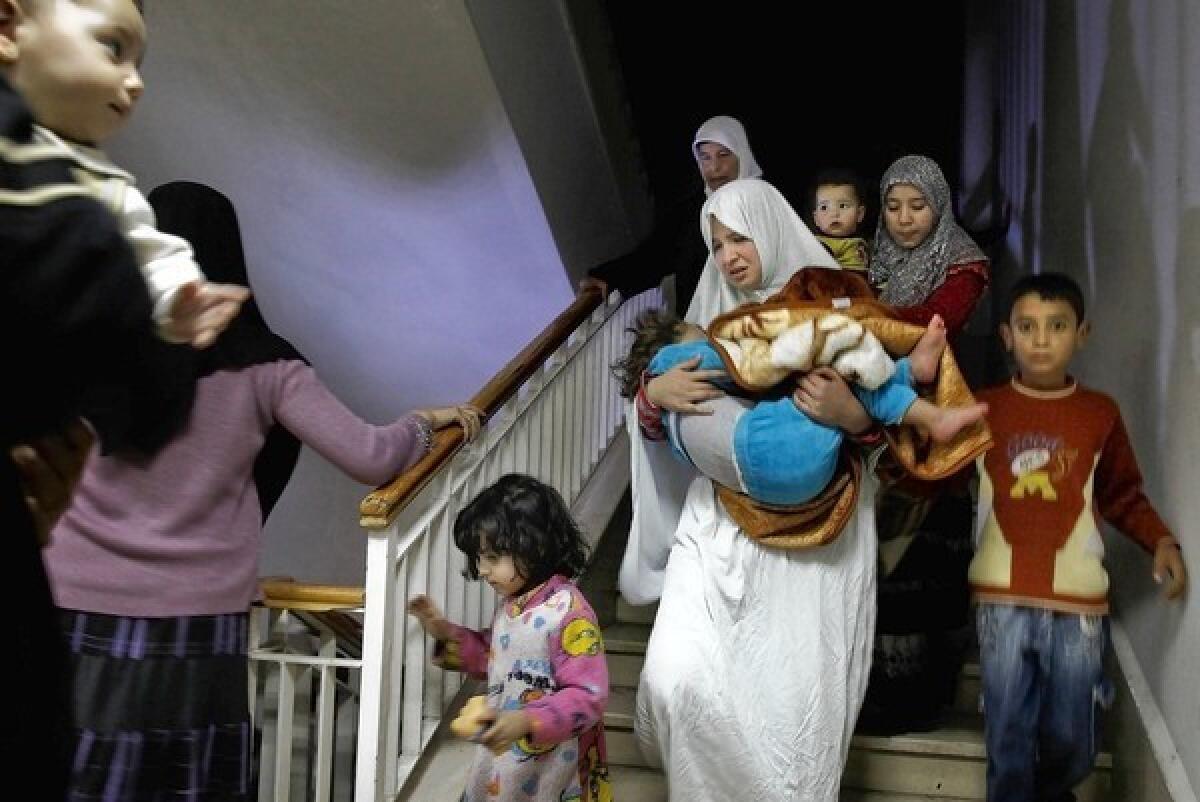In Syria, small-town rebels are stuck in big-city Aleppo

- Share via
ALEPPO, Syria — They are this ancient city’s bedraggled warriors: plowmen and laborers, mechanics and carpenters who came from the countryside this summer to “liberate” this formerly freewheeling town attuned to the rhythms of commerce.
Now they’re stuck here.
Bogged down by a relentless urban combat they’re ill-equipped to fight, the rebels daily endure both government bombardment and thinly veiled hostility from the resentful residents of a mercantile hub turned dystopia.
These rebels who entered Aleppo from semirural, tradition-bound suburbs and agricultural areas found no spontaneous outpouring of support, no waves of sleeper cells yearning to join the revolution. Many shopkeepers in the historic Old City seem to avoid eye contact with the scruffy legions strutting along the cobblestoned streets of this former Silk Road terminus.
A reporter escorted by rebels on a recent visit couldn’t escape the sensation of accompanying an occupying force.
The widely divergent backgrounds of fighters and Aleppo residents underscore a continuing tension that probably contributed to the stalling of the rebel advance.
It has been more than three months since the rebel brigades slipped into mostly sympathetic, largely working-class Sunni Muslim districts along the city’s northern, eastern and southern edges. But the advance mostly halted at the borders of more mixed and prosperous areas where the government still enjoys support.
Today, Aleppo remains divided along a roughly four-mile front line separating government and rebel-controlled zones.
Neither side has been able to push forward much in what appears to be an enduring stalemate, even as casualties mount and the destruction proceeds inexorably, creating vistas of pancaked apartment blocks and rubble-strewn lots in one of the world’s oldest continuously occupied cities.
Some rebel commanders openly regret the decision made in mid-July to attack the city directly. Filled with false confidence after chasing government troops from nearby districts, rebels eschewed a more classic guerrilla strategy of gradual advance via strikes on police stations, military posts and other security targets.
“We gave the regime an excuse to attack civilians,” laments Ahmed Obeid, who heads the Amr ibn al-As Division, one of perhaps 10 major rebel groupings fighting here. “We are not military men. We have made mistakes.”
Despite their initial miscalculation of swift victory, Obeid and other insurgent commanders now insist retreat is impossible.
“If we pull out, any civilian who gave as much as a glass of water to one of our men will face execution,” says the soft-spoken Obeid, known as “the Teacher” because of more than 20 years spent as a high school math instructor in the agricultural town of Azaz, 30 miles to the northwest, a major feeder zone for insurgent forces.
The fighters’ conservative rural pedigree is quite distinct from the multi-religious ethos associated with urban Aleppo, a trading crossroads since the days of Egypt’s pharaohs.
“I am a farmer,” says an uncannily cheerful Abu Mahmoud as he and Kalashnikov-toting fighters stand guard in front of a derelict pistachio wholesaler amid the wreckage of the medieval-era Souk Madina, once counted among the Middle East’s best-preserved ancient markets.
The fighters’ hometowns are all overwhelmingly Sunni areas brimming with antipathy for President Bashar Assad and his dominant Alawite sect, an offshoot of Shiite Islam.
Abu Mahmoud and his comrades take turns resting on thin mattresses placed in gutted shops beneath the vaulted stone ceilings of the venerable bazaar. They extend little sympathy to the occasional shop owner who braves sniper fire to check on the status of his property.
Many combatants say without hesitation that they don’t expect to survive this battle. Religious belief seems to sustain them.
“We are here for God,” says Abu Mahmoud, 40, a mustachioed father of six who bears a striking resemblance to Bob Hoskins, the British actor.
On occasion, he leads exhausted colleagues in morale-boosting, rhythmic shouts of “God is great!” the cry echoing through the narrow passageways of the souk. The collective proclamation is designed to intimidate government snipers, positioned not more than 50 yards away and surely suffering their own tribulations and losses.
Aleppo’s monumental medieval Citadel, now a government fortress, looms in the distance, just visible from some streets outside. Acrid smoke rises from mounds of uncollected trash as demoralized residents line up for bread, ever wary of incoming projectiles drawn to crowds, perhaps directed by ubiquitous spotter aircraft buzzing in the skies.
On the serpentine streets of the Old City, traversed by generations of invaders, adventurers and traders, many residents hardly hide their disdain for the disheveled legions who have come to occupy their previously prosperous town. The district is home to many Christian and Sunni merchants, whose clientele included middle- and upper-class Syrians and foreign visitors.
Here, many applauded government economic initiatives that benefited Aleppo’s urban commercial class but further marginalized the rural poor, creating fertile ground for revolt in the countryside.
“No one is safe,” says a bewildered elderly resident, who gives his name as Abu Hamed, wandering a few yards from Bab al Maqam, a 15th century gate to the ancient quarter. Before drifting away, Abu Hamed complains about the daily bombardment, rising prices and the shock of no longer recognizing the place he has lived all his life.
Deeper into the narrow passageways, close to the front lines, no shops are open. Few people are seen, other than rebel gunmen.
One Old City merchant stands crouched beneath an ageless stone doorway, across from a shut-down factory where Aleppo’s signature olive-oil-based soaps were once produced. Nearby, rebel militiamen huddle around a sheik delivering an afternoon Koranic tutorial. The businessmen of the Old City, the merchant explains, are caught in the middle, and no one sees a way out.
“Maybe we will all die here,” he muses, seemingly as resigned to his fate as the men with guns.
More to Read
Sign up for Essential California
The most important California stories and recommendations in your inbox every morning.
You may occasionally receive promotional content from the Los Angeles Times.













